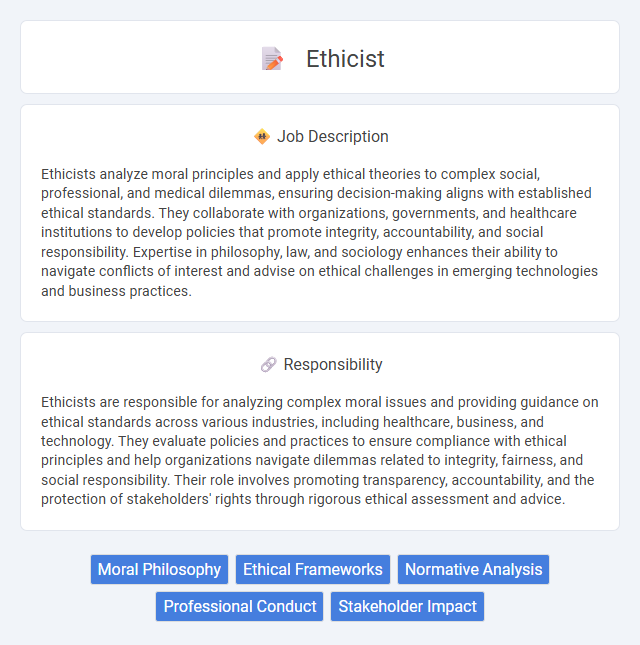
Ethicists analyze moral principles and apply ethical theories to complex social, professional, and medical dilemmas, ensuring decision-making aligns with established ethical standards. They collaborate with organizations, governments, and healthcare institutions to develop policies that promote integrity, accountability, and social responsibility. Expertise in philosophy, law, and sociology enhances their ability to navigate conflicts of interest and advise on ethical challenges in emerging technologies and business practices.
People with strong moral reasoning skills and a genuine interest in ethical dilemmas are likely suitable for an ethicist role. Those who are comfortable analyzing complex situations and maintaining impartiality may find this job fulfilling. Individuals struggling with ambiguity or ethical conflicts might face challenges in this career.
Qualification
Ethicists require a strong academic background, typically holding advanced degrees in philosophy, ethics, law, or related fields. Proficiency in ethical theory, critical thinking, and moral reasoning is essential, along with experience in applied ethics in sectors such as healthcare, business, or technology. Certifications in bioethics or corporate ethics, combined with excellent communication skills, enhance qualifications for ethical advisory roles.
Responsibility
Ethicists are responsible for analyzing complex moral issues and providing guidance on ethical standards across various industries, including healthcare, business, and technology. They evaluate policies and practices to ensure compliance with ethical principles and help organizations navigate dilemmas related to integrity, fairness, and social responsibility. Their role involves promoting transparency, accountability, and the protection of stakeholders' rights through rigorous ethical assessment and advice.
Benefit
An ethicist likely provides valuable guidance to organizations by identifying potential moral dilemmas and promoting responsible decision-making. Their expertise may improve corporate reputation and trust among stakeholders, reducing the risk of ethical breaches and legal issues. Engaging an ethicist could enhance workplace culture by fostering integrity and accountability throughout the company.
Challenge
The role of an ethicist likely involves navigating complex moral dilemmas where clear answers are rare, requiring careful analysis and judgment. Challenges may arise from balancing diverse stakeholder values and societal norms while ensuring ethical principles are upheld. The job probably demands resilience and adaptability in addressing evolving ethical issues in various fields such as healthcare, technology, or business.
Career Advancement
Ethicists specializing in applied ethics, bioethics, or corporate ethics often advance by gaining expertise in regulatory compliance and ethical policy development. Progression in this career typically involves roles such as ethics officer, compliance director, or consultant within healthcare, technology, or government sectors. Professional certifications like Certified Compliance & Ethics Professional (CCEP) and advanced degrees in philosophy or law enhance advancement opportunities and leadership potential.
Key Terms
Moral Philosophy
Ethicists specialize in moral philosophy, analyzing principles that govern right and wrong behavior. They evaluate ethical dilemmas by applying theories such as utilitarianism, deontology, and virtue ethics to guide decision-making in fields like healthcare, law, and technology. Their expertise supports organizations in creating policies that align with societal values and promote moral responsibility.
Ethical Frameworks
Ethicists develop and apply ethical frameworks to guide decision-making in diverse fields such as healthcare, technology, and business. They analyze moral principles like utilitarianism, deontology, and virtue ethics to address complex dilemmas and promote responsible conduct. Their work ensures organizations embed accountability and integrity by aligning practices with societal values and legal standards.
Normative Analysis
Ethicists specializing in normative analysis systematically evaluate moral principles to determine what actions are right or wrong within various contexts. They apply ethical theories such as deontology, utilitarianism, and virtue ethics to guide decision-making in healthcare, law, and business. Their expertise supports organizations in developing policies that align with societal values and promote ethical responsibility.
Professional Conduct
Ethicists play a critical role in guiding professional conduct by analyzing and interpreting ethical principles within various industries. They ensure organizations adhere to codes of ethics, promoting transparency, accountability, and integrity in decision-making processes. Their expertise helps prevent ethical breaches and fosters a culture of responsibility and trust.
Stakeholder Impact
Ethicists play a critical role in evaluating the ethical implications of decisions on diverse stakeholders, including employees, customers, shareholders, and the broader community. Their analysis helps organizations navigate complex moral dilemmas, ensuring policies promote fairness, transparency, and social responsibility. By integrating ethical frameworks, ethicists enhance stakeholder trust and contribute to sustainable business practices.
 kuljobs.com
kuljobs.com